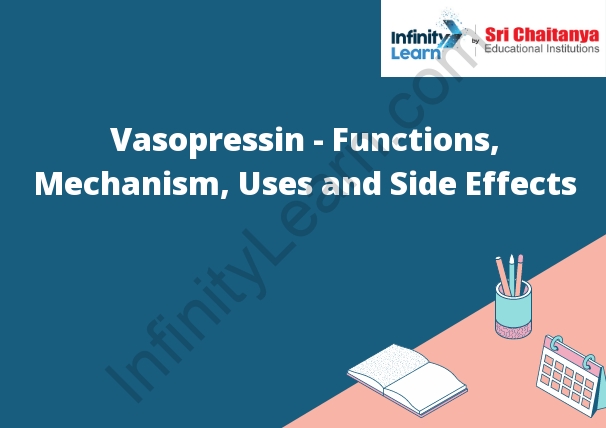Table of Contents
Introduction to Vasopressin
Vasopressin is a hormone that regulates blood pressure and volume by constricting blood vessels and increasing the amount of water that the body retains. It is a peptide hormone that is synthesized in the hypothalamus and released from the posterior pituitary gland.
Arginine vasopressin (AVP), also known as antidiuretic hormone (ADH), is a peptide hormone that increases water reabsorption by the kidneys, thereby decreasing the amount of urine produced. It is also responsible for increasing blood pressure by constricting blood vessels.
The ADH action in the kidneys is to stimulate the insertion of water channels (aquaporins) into the cells of the collecting ducts. This increases the reabsorption of water from the urine, which decreases the volume of urine produced.
The ADH action in the central nervous system (CNS) is to stimulate the thirst center in the hypothalamus. This increases thirst and promotes drinking, which increases the amount of water in the body.
The mechanism of action of vasopressin is to bind to specific receptors on the cells of the collecting ducts and stimulate the insertion of water channels (aquaporins). This increases the reabsorption of water from the urine, which decreases the volume of urine produced.
The side effects of vasopressin can include headache, nausea, vomiting, and low blood

Kidney
- The kidneys are two bean-shaped organs located on either side of the spine in the lower back. The primary function of the kidneys is to remove wastes and excess fluid from the body. The kidneys also play a role in regulating blood pressure, red blood cell production, and calcium levels.
- A kidney is a bean-shaped organ that filters blood to remove waste products and excess fluid. The two kidneys are located at the back of the abdominal cavity, one on each side of the spine. Each kidney is about 10 cm long and 5 cm wide. The kidney is made up of about a million tiny filters called nephrons. The nephrons remove waste products and excess fluid from the blood. The filtered fluid becomes urine, which passes out of the body through the urethra.
Central Nervous System
- The central nervous system is the system that regulates the body’s responses to its environment. It consists of the brain and the spinal cord. The brain is the body’s control center, and the spinal cord carries messages between the brain and the rest of the body.
- The central nervous system (CNS) is the part of the nervous system that consists of the brain and spinal cord. The CNS is responsible for the control of all voluntary and involuntary activities in the body. The CNS is also responsible for the interpretation and execution of thoughts, emotions, and sensations.
Primarily AVP has Two Functions:
1. To Help Regulate Fluid Balance
AVP helps the body maintain a balance of fluids by regulating the amount of water released into the urine. When the body becomes dehydrated, AVP signals the kidneys to release more water into the urine. When the body has too much water, AVP signals the kidneys to release less water in the urine.
2. To Regulate Blood Pressure
AVP also helps to regulate blood pressure by constricting blood vessels. When blood pressure gets too high, AVP signals the vessels to tighten up and constrict. When blood pressure gets too low, AVP signals the vessels to relax and open up.
Vasopressin Use
- Vasopressin is a hormone that is produced by the pituitary gland. It is responsible for controlling the water balance in the body and the blood pressure.
- Vasopressin is also used to treat water intoxication and low blood pressure.
- Vasopressin is a hormone that is produced in the brain. It helps to control the balance of water and salt in the body. Vasopressin is also known as antidiuretic hormone or ADH. It is released from the hypothalamus in response to changes in the body’s blood volume or osmolality. Vasopressin helps the body to conserve water by reducing the amount of water that is expelled in urine.
- Vasopressin is used to treat a number of medical conditions including low blood pressure, dehydration, and heart failure. It is also used to prevent bleeding in people who are taking blood thinners. Vasopressin can be given as an injection or as a nasal spray.
- The most common side effects of vasopressin are headache, nausea, and vomiting. Vasopressin can also cause low blood pressure and confusion.
Common Side Effects Include
- headache,
- nausea,
- vomiting,
- stomach pain,
- diarrhea,
- constipation,
- dizziness,
- tiredness,
- flu-like symptoms,
- joint pain,
- back pain,
- itching,
- rash.








